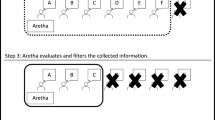Abstract
This paper addresses a problem for theories of epistemic democracy. In a decision on a complex issue which can be decomposed into several parts, a collective can use different voting procedures: Either its members vote on each sub-question and the answers that gain majority support are used as premises for the conclusion on the main issue (premise based-procedure, pbp), or the vote is conducted on the main issue itself (conclusion-based procedure, cbp). The two procedures can lead to different results. We investigate which of these procedures is better as a truth-tracker, assuming that there exists a true answer to be reached. On the basis of the Condorcet jury theorem, we show that the pbp is universally superior if the objective is to reach truth for the right reasons. If one instead is after truth for whatever reasons, right or wrong, there will be cases in which the cbp is more reliable, even though, for the most part, the pbp still is to be preferred.
Similar content being viewed by others
References
P.J. Borland (1989) ArticleTitleMajority systems and the Condorcet Jury Theorem Statistician 38 181–189
G. Brennan (2001) ArticleTitleCollective coherence International Review of Law and Economics 21 197–211 Occurrence Handle10.1016/S0144-8188(01)00056-4
B. Chapman (1998a) ArticleTitleLaw, incommensurability, and conceptually sequenced argument University of Pennsylvania Law Review 146 1487–1582
B. Chapman (1998b) ArticleTitleMore easily done than said: Rules, reason and rational Social choice Oxford Journal of Legal Studies 18 293–329 Occurrence Handle10.1093/ojls/18.2.293
J. Cohen (1986) ArticleTitleAn epistemic conception of democracy Ethics 97 26–38 Occurrence Handle10.1086/292815
Condorcet, J.A. de (1785). Essai sur l’application de l’analyse à la probabilité des décisions rendues à la pluralité des voix, l’Imprimerie Royale, Paris, partly translated into English in McLean and Urken (1995).
Elster, J. (Ed.) (1998). Deliberative democracy. Cambridge University Press.
D. Estlund (1990) ArticleTitleDemocracy without preference Philosophical review 49 397–424 Occurrence Handle10.2307/2185349
D. Estlund (1993) Making truth safe for democracy David Copp Jean Hampton John E. Roemer (Eds) The Idea of Democracy Cambridge University Press New York 71–100
D. Estlund (1994) ArticleTitleOpinion leaders, independence and Condorcet’s Jury Theorem Theory and Decision 36 131–162 Occurrence Handle10.1007/BF01079210
Estlund, D. (1997). Beyond fairness and deliberation: The epistemic dimension of democratic authority. Deliberative Democracy, In: James Bohman and Willian Rehg (Eds.), Cambridge, Mass.: MIT Press, pp. 173–204.
D. Estlund (1998) ArticleTitleThe insularity of the reasonable: Why political liberalism must admit the truth Ethics 108 252–275 Occurrence Handle10.1086/233804
A.I. Goldman (1979) What is justified belief G.S. Pappas (Eds) Justification and Knowledge Reidel Dordrecht 1–23
B. Grofman G. Owen S.L. Feld (1983) ArticleTitleThirteen theorems in search of the truth Theory and Decision 15 261–278 Occurrence Handle10.1007/BF00125672
C. List R.E. Goodin (2001) ArticleTitleEpistemic democracy: Generalizing the Condorcet Jury Theorem Journal of Political Philosophy 9 277–306 Occurrence Handle10.1111/1467-9760.00128
L.A. Kornhauser (1992a) ArticleTitleModelling collegial courts. I. path-dependence International Review of Law and Economics 12 169–185 Occurrence Handle10.1016/0144-8188(92)90034-O
L.A. Kornhauser (1992b) ArticleTitleModelling collegial courts. II. Legal doctrine Journal of Law, Economics and Organization 8 441–470
L.A. Kornhauser L.G. Sager (1986) ArticleTitleUnpacking the court Yale Law Journal 96 92–117
L.A. Kornhauser L.G. Sager (1993) ArticleTitleThe one and the many: Adjudication in collegial courts California Law Review 81 1–59
McLean I., Urken, A.B. (translators and editors) (1995). Classics of social choice. Ann Arbor: University of Michigan Press.
G. Owen B. Grofman S.L. Feld (1989) ArticleTitleProving a distribution-free generalization of the Condorcet Jury Theorem Mathematical Social Sciences 17 1–16 Occurrence Handle10.1016/0165-4896(89)90012-7
J. Pearl (1988) Probabilistic reasoning in intelligent systems: Networks of plausible inference EditionNumber2 Morgan Kaufmann San Francisco, CA
Pettit P. (2001). Deliberative democracy and the discursive dilemma. Philosophical Issues 11 (supplement 1 of Nous 35), 268–295.
Pettit, P., & Rabinowicz, W. (2001). The Jury Theorem and the discursive dilemma. Philosophical Issues, 11(supplement 1 of Nous 35), appendix to Pettit (2001), pp. 295–299.
Rousseau, J.-J. 1997 (1762). The social contract. In: Victor Gourevich and Quentin Skinner (Eds.), The ‘Social Contract’ and other later political writings, Cambridge: Cambridge University Press.
Author information
Authors and Affiliations
Corresponding author
Rights and permissions
About this article
Cite this article
Bovens, L., Rabinowicz, W. Democratic Answers to Complex Questions – An Epistemic Perspective. Synthese 150, 131–153 (2006). https://doi.org/10.1007/s11229-006-0005-1
Issue Date:
DOI: https://doi.org/10.1007/s11229-006-0005-1




